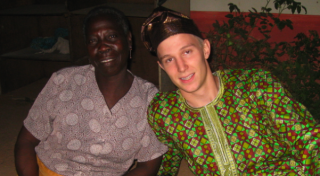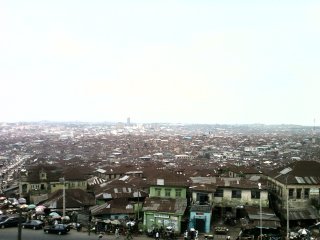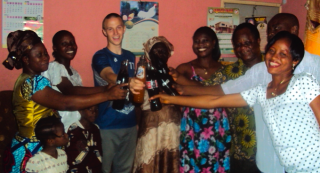 Jeremy Kwabena Ginsburg
Jeremy Kwabena Ginsburg
 Wani Olatunde
Wani Olatunde
Keegan Kolade O'Neil
EXPERIENCING AFRICA
I studied abroad in Ibadan, Nigeria. I chose to go there because I was studying Yoruba in college. Before leaving for Ibadan, I had become highly proficient in Yoruba, as I was already at a 4th year level in my second year of study .
Nigeria has a reputation that precedes it. My Nigerian professors didn't seem to want to scare me off, but they also didn't want to paint a bucolic picture that would prove false upon arrival. Many of my impressions came from the only travel book on the market for Nigeria (the Bradt guide), which suggested that Nigeria can be loud, confusing, and hot, but this chaos also binds the community together and makes Nigerians interdependent even more than many other nations on the continent. I certainly knew that I wasn't going to be having much of a vacation, but I was excited at the guarantee of a genuinely different cultural experience and, sometimes, an adventure. Nigeria is certainly known, also, for being a little dangerous, but that danger is not only blown out of proportion, but is also misapplied. Books and people will tell you about the past dictators and current armed robbers, but the real danger is the traffic. In fact, UW Madison eventually dropped my program a day before I was set to leave over safety concerns. I and my colleagues ended up leaving the university for a year and transferring our credits in.
My first impressions were unfortunately colored by my expectations, but soon those were overridden by the reality of Nigeria. I was incredibly paranoid for about a week, hearing sounds in the night that weren't there, some that were. The first night we arrived in Lagos, a man came to our door in the middle of the night and we were sure he wanted to rob us or do one of the many horrible things I had read in the guidebook or online. Similarly, I heard shouting and loud bangs in the city of Ibadan my first night there and couldn't sleep for fear that angry mobs were on their way to my door. I feel like a complete schizo thinking about my thoughts those nights, but, as I said, I was still trusting the word of westerners instead of my host family and teachers.
I couldn't believe how hot it was. The humidity kept me sweating all day. Having visited Mexico, Costa Rica, and Morocco before, I was still surprised at some of the infrastructural oddities of Ibadan. There would be no traffic lights or signs or lines on the roads, but everyone used cell phones all of the time. I also was not a big fan of Yoruba food at first, but that changed with time. Though I'm a vegetarian, I took a break while I was there and find that I can't help but suspend my own rules when I see a plate of suya in front of me.


I lived with a professor and his wife. They had had six children, but they all had moved away, so I lived with the neighborhood 'grandma' and 'grandpa.'
We lived in the bottom flat of a three story building on the University of Ibadan campus far from most of the campus buildings. The other families included kids of all ages, some who acted as peers and others and soccer friends. I met one of my best friend from Nigeria, Bimbo Benson, living in that building. I'm afraid sometimes that people will think I'm exaggerating when I say that I could not have asked for a better set of host parents. They had incredible patience with my attempts to learn and adapt to the country while accepting that they could not always understand where I was coming from. By a month in, I felt as though I had always lived there. There may be a lot of stresses that come with living in Nigeria and adapting to a foreign culture, but my experience with Nigerians is one that proves their reputation as some of the most accommodating hosts in the world.
Regarding culture shock, I was more surprised at how different it was to come home. In Nigeria, I could remake myself on some level and knew that my experience and friendships were probably not permanent. When I came home, though, I felt as though there was a life I used to have that I should be fitting back into, but I couldn't. You can't come back from an experience like that and be the person your friends and family remember you as, but you can certainly be better if you adapt the lessons you learned there to the life you live here.
Living in a society outside of my own could be difficult at times, but finding good friends helped. I became very close with some of the students that were there with me, but I also made some very close Nigerian friends that I still talk to. I also felt very connected to my host parents, and it was just as hard to leave them by the end as it was to leave my real parents at the beginning. Sometimes it was hard to see if someone wanted to be friends because they liked me or because they thought they could get something from me. I think most people within the university, though, didn't know what to do with us. I think we had weird accents in their language that almost no one had heard before. I can't say enough about how well my host family fit me into their functions, including the lead up to my host sister's wedding. I unfortunately missed the actual event due to a bout with malaria, but I appreciated the work they put into getting me clothing with the family pattern and driving me around town to meet the extended family. I didn't feel as though I had a huge circle of friends, but I certainly had a family there.
I was in Ibadan to learn Yoruba, so there was definitely a language barrier for the first few weeks. I would say that I was both surprised at how well prepared I was, but also how hard it was to keep up with the things people said. I was going into my ninth semester of Yoruba, but all of that vocabulary didn't prepare me to hear 'O wa nibe' as 'O wa nbe,' as close as they seem. Overall, I was happy at how much I already knew, and also how much I learned about speaking, listening, and using local terms and colloquialisms. We also picked up a number of choice words from cab drivers that you wouldn't want your host mom to catch you saying, and at times, with the traffic in Nigeria, those turned out to be the most useful.
"Though I'm a vegetarian, I took a break while I was there and find that I can't help but suspend my own rules when I see a plate of suya in front of me."
I had so many memorable experiences that it's hard to choose just one. Additionally, some of the most memorable were memorable precisely because they were frightening. For example, the day we arrived in Ibadan, just as we came off of the highway ramp into the market, we heard loud popping: going back onto the highway we had just left was a truck of armed robbers speeding away followed by a Nigerian police truck firing assault rifles at them. Absolutely everyone in the market ducked and we all just looked at each other wondering what we had gotten ourselves into. That turned out to be a one-time experience, though, and every interaction I had with the police after that was incredibly courteous and pleasant. My other memory was sneaking off to Kano. My friend and I had been told in no uncertain terms that we were not to go to the North. This was just after Osama Bin Laden had been assassinated and a month after election riots had turned Kano upside down. We arranged to stay with a Couchsurfer in the city, announced to everyone that we were heading to Abuja for a week, and promptly boarded a bus to the North.
Finally, Nigeria taught me to stop worrying about what others think about me as I would stick out no matter where I was in the country.
It seems like we in the United States try to pretend around a lot of minor cultural taboos, but Nigerians will do what makes sense. Free cans of soda at the party? Bag a couple up and take them home. Feel like sleeping at a long meeting? Just do it.
I miss the constant adventure that walking out of my door was every day. I also miss greeting people that I saw on a regular basis while walking to school or buying food. Tangential relationships rarely exist in the US, but in Nigeria, they abound. I also miss getting extremely cheap food being made over an open fire and eating it under a tree. I miss how much value I put on things like getting food I liked, or playing a game of soccer with other students. Sometimes I even miss the smell of thick diesel smoke in the air as I'm walking down the side of the road. I miss the absolute insanity and cacophony out in the city, and yet other times I am happy to have so much peace and silence when I want it. I miss the kids knocking mangos off the trees with their long sticks.
I don't miss the sometimes maddening attention that my presence would draw in most situations. I also don't miss people trying to price gouge me because they profile me. I don't miss the Jurassic-sized cockroaches or the hour and a half of prayers and introductions that prefaced even the smallest meetings. I don't miss power outages or drinking all of my water out of plastic bags. I don't miss hand washing all of my clothes. I really don't miss malaria.
My advice for students studying abroad in West Africa is "DON'T OVER PACK". I came with a hiking bag and a backpack for nine months and there were still things I don't think I needed. Others checked two bags and packed toiletries for nine months. If you need something there, then obviously it will be sold there. I also encourage students to try to learn outside of the classroom. I learned more about Yoruba language and culture running around the city and jumping into cabs than I ever did in the classrooms.
I spent over a year in Nigeria and my little taste of Africa has only increased my appetite. If I had to sum up my experience in three words, I would say that my time in Nigeria was "hot, unpredictable and real".

The bus took all night to get there, simply stopping on the road for a few hours round 3am, but playing ABBA's greatest hits the entire night. I will never forget trying to sleep in a bus seat somewhere outside of Kaduna as our driver is setting up his prayer mat on the road outside and Dancing Queen is playing at three in the morning. We ended up traveling all over Kano and seeing some amazing sights like 500 year old dye pits and magnificent mosques. I was glad that I had the chance to travel outside of Yoruba land and see some other parts of the country.

1of 3
2
I went through all of the classic steps of culture shock, but I felt as though I dealt with it fairly well. The first few weeks were a honeymoon with the country. Everything I saw and did was absolutely new. Over time, though, some things wore on me.
I'm not sure we ever met another Oyinbo that spoke anything past Yoruba greetings. I enjoyed this because it lent the whole experience and level of foreignness and adaptation to being a minority, albeit a privileged one. This, though, also meant that we really, really stuck out. After a while, being shouted at everywhere you went got old and sometimes stressful if we were trying to get something done at the moment. Eventually, though, you just get used to it and appreciated the random conversations you can have with people around the town.
My family thought that going to Nigeria was a good idea, but I think they were worried about safety a little bit. There is no way they would have even asked me not to go, I think they were just inwardly nervous about my safety. Afterward, they have agreed wholeheartedly that it was an incredibly valuable experience to have.
"It seems like we in the United States try to pretend around a lot of minor cultural taboos, but Nigerians will do what makes sense."
2 of 3
3 of 3
Society & Culture
Keegan studied abroad in Ibadan, Nigeria for over a year to study Yoruba. Whilst there, he immersed himself in Yoruba culture and learned a lot about Nigerian society as a whole.
Keegan with host Mum
Keegan with host family
Ibadan
 Magazine Posts
Magazine Posts Table of Contents
Table of Contents